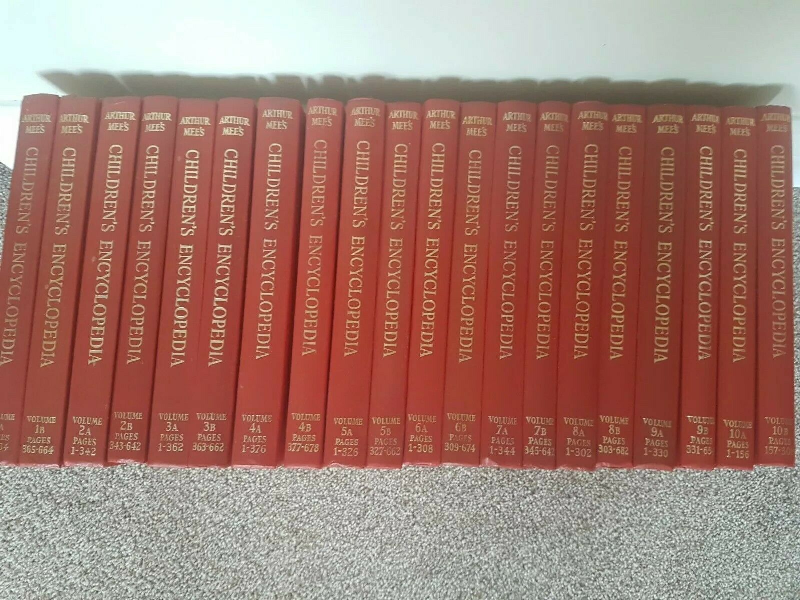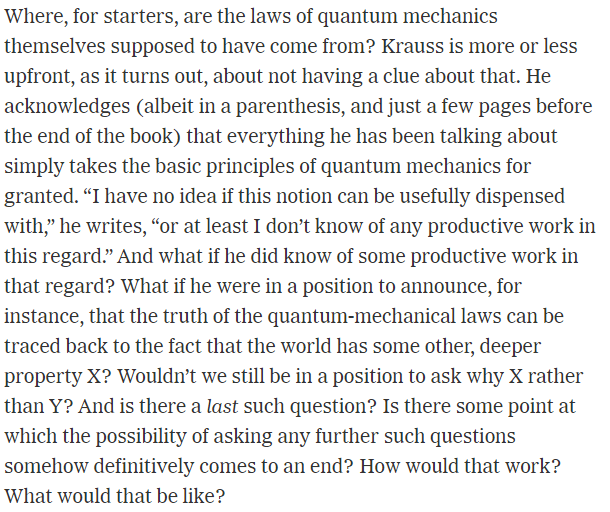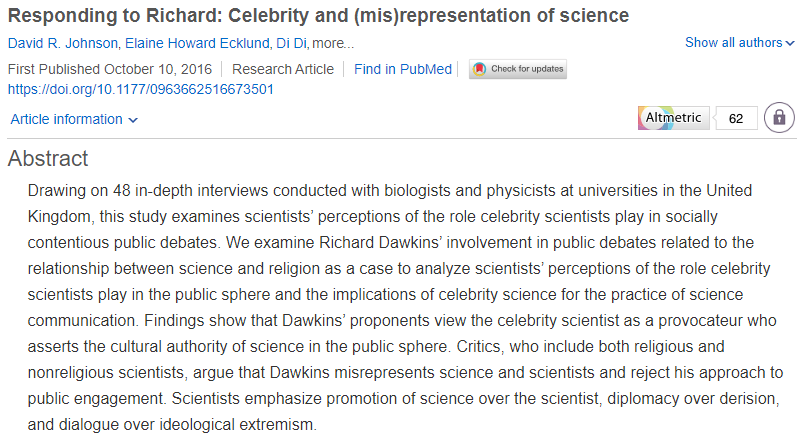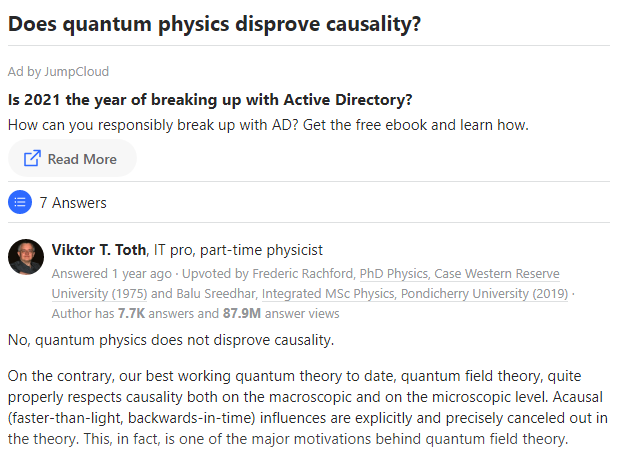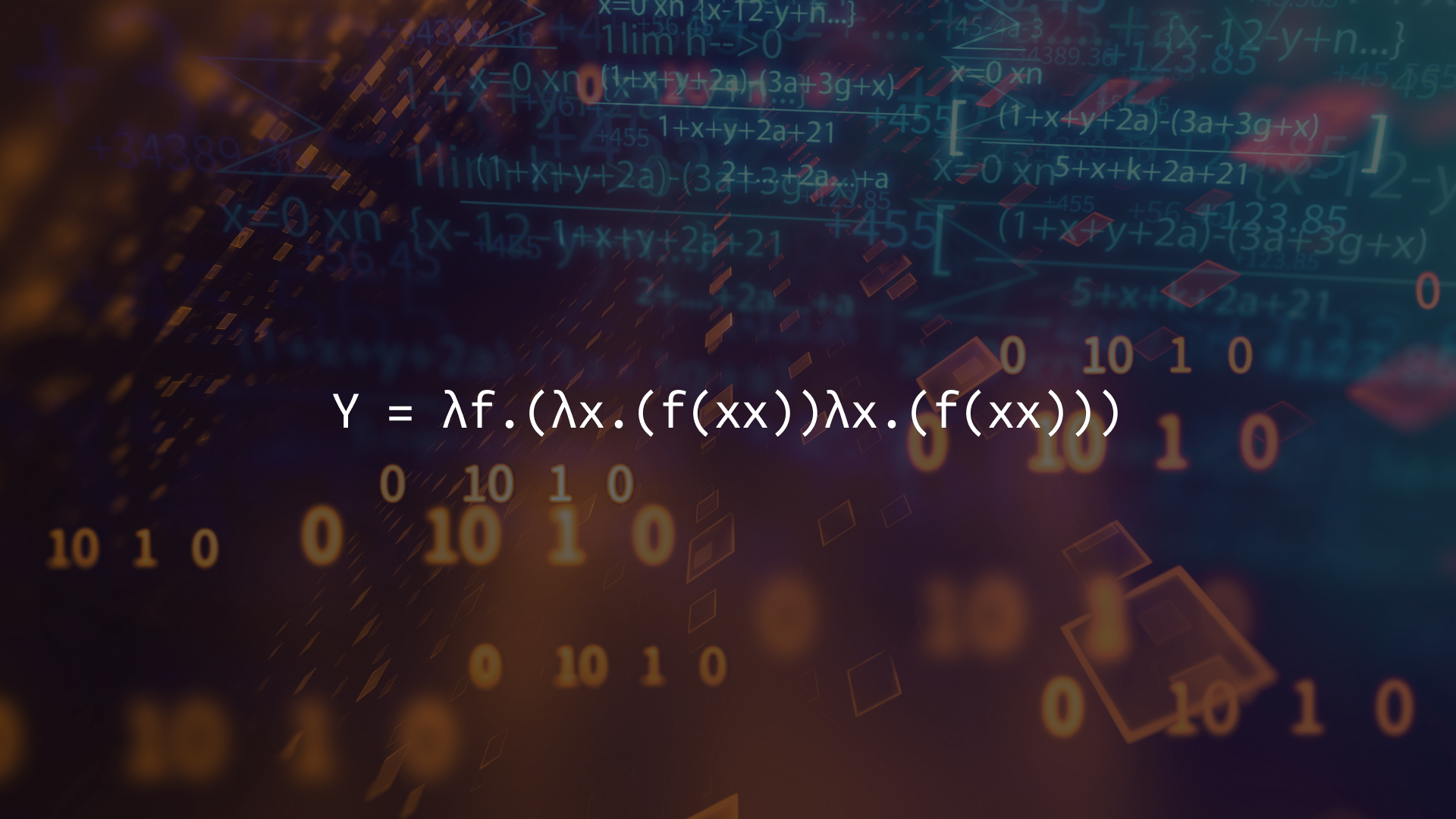
Everything posted by Holmes
-
The Schrödinger's cat thought experiment proves there is no God
Well actually lets focus on what I did say. I said that all scientific explanations must presuppose the presence of material quantities and laws that relate these quantities. Are you aware of a scientific explanation that does not have that characteristic? No, of course you are not. Therefore a scientific explanation for the origin of material quantities and laws is clearly paradoxical because it must first presuppose the presence of the things it seeks to explain. Consider for a moment a mathematical theory that explains the origin of matter, energy, etc what would its axioms be? what laws, equations might we find in such a theory? I do not see how our inability to predict the future for certain physical systems undermines what I've said. If you are trying to argue that anything can happen at any time, matter, fields, laws can appear uncaused where there were none before then you are reducing science to magic which is odd since when supernatural explanations are posited it is you and others (no doubt) who will accuse those advocating that view, of belief in magic. Perhaps you are confusing the state of a physical system with the system itself, I may not be able to predict a dice throw but I'm not trying to, I'm asking how can the dice come to exist in the first place. The bottom line here is this - there cannot possibly ever be a scientific explanation for the presence of the universe, that's my thesis. So one either accepts that and says that the end result of all our science is that it explains absolutely nothing or we posit another kind of explanation, a non-scientific explanation, an explanation that does not presuppose matter, energy, laws. On what grounds do you object to me positing this?
-
The Schrödinger's cat thought experiment proves there is no God
Material quantities are what we represent with variables in our mathematical theories. See? D, B, J etc. I hope this helps. Now you mention "chaotic scenarios" well that requires something physical and it is the origin of this - of anything - physical, that's what I'm concerned with. The point is that whatever it is one postulates as you are doing, is something who's presence must be explained IF REALITY CAN BE EXPLAINED SCIENTIFICALLY. Of course, I get that, I don't dispute that but "noise" is a material phenomena is it not? How can one even write down a model without referring to something that's presupposed? Right, so that mathematical function is presupposed yes? it's origin is not addressed nor can it be unless we first presuppose something else. It was clear but hardly amounts to a rebuttal of anything I've said.
-
From the past
Ahh libraries, I forgot to mention those, do children still visit libraries in this day and age? I was most fortunate, Liverpool had/has a superb central library close to the museum, it was stuffed full of books and has many valuable editions too, this is a recent picture. Since I left the area some forty years ago there have been modernizations but that reading room remains. Back in the late 70s when I'd visit there and spend all day sometimes, I'd also explore many little back passageways around the rim of that room, these often led to quiet, dusty, unused office rooms with remnants of activity in days gone by, no idea what those areas were ever really used for. There were other large rectangular rooms too, not just that circular reading room, the place was a maze and I was able to find many very obscure old books on mathematics and physics, some of which had clearly never been taken out since they were purchased by the library, which was often decades earlier.
-
From the past
They were great books, I recall having two or three of those that I picked up or found or were given to me. In particular was the one on "Water" I recall falling asleep in the bath tub reading that, the bottom of the book got wet, it amused my young daughter no end when I told her that!
-
From the past
I'm 61 years old and was born in Liverpool, England. As a child (perhaps 8 or 9) my mother saw an ad in a magazine to buy a set of children's encyclopedias, with this deal we got all the books at once and simply paid the small monthly fee until paid off, we were poor so this was not trivial. I was actually unwell the day these books arrived, I was lying under a blanket on a couch near our coal fire when she walked in and announced this purchase and carried in these two large heavy boxes, dumped them by the couch and left me to read, this was a life changing event for me and led to my interest in all matters technical and scientific. The books were these: Now long lost I still have very fond memories of sitting around our house on a quiet sunny day or winter evening, deeply immersed in these books. There was a structure that included history, religion, science, art and so on, also a fun section "Things to make and do" which also leaned in a science direction. Later as an adult I stumbled upon a complete set of these and bought them (52 weekly magazines stored in two binders): These were published in the 1930s, shortly before WW2 and would have been extremely interesting to me as a child, I still peruse these from time to time. The point of this post is to ask whether others here initially learned about science in this way and what do you think of todays options, do children still read books like this? are there magazines published like these? I have absolutely no idea how my learning experience would have gone had I had access to the web as we do today, I work in technology and use the internet heavily so I'm aware of its nature, I kind of think that it would not be as rich an experience as it was back then but this is inevitably subjective.
-
The Schrödinger's cat thought experiment proves there is no God
Please explain, what does "process couple be conceptual" mean?
-
The Schrödinger's cat thought experiment proves there is no God
Yes this is true. Mentioning conservation law was a step I took to show that science often does not demonstrate (as you appear to believe) the truth of some claim, much of science and our claims about the universe are in fact all based on scientific induction. As for my claim that material quantities must exist in order for material processes to operate, this is not something that needs evidential support, it is in fact a definition of material processes. Like the claim we cannot cook without a source of energy, this does not need evidence it is inherent in the definition of cooking.
-
The Schrödinger's cat thought experiment proves there is no God
The reason I mentioned conservation laws was to draw your attention to the fact that these are accepted as true not by being demonstrated as true but by scientific induction. Asking me to demonstrate that material quantities must exist in order for material processes to operate is illogical, material processes are by definition state changes within systems of matter/energy. I really don't think you've been following my arguments.
-
The Schrödinger's cat thought experiment proves there is no God
See: Conservation Laws. I never said "immaterial processes require the material objects".
-
The Schrödinger's cat thought experiment proves there is no God
My position is that material quantities must exist in order for material processes to operate. A scientific explanation for anything at all therefore must presuppose the presence of material quantities. In the absence of material quantities no processes could occur, if they did then obviously the system does in fact have material properties. Take any scientific theory, lets say a neat mathematical theory, look at it, it has axioms and refers to material quantities, it presupposes their existence. The point is we cannot say this or that is the result of naturalistic, material activities unless there is an already existing physical realm, in the absence of material and laws nothing can ever happen (and if something did happen then there was not in fact an absence of matter/law in the first place). One cannot invoke science and scientific explanations to explain how such things are possible. PS: Must you append sarcastic remarks at the end of your posts? There are many vocal critics of Krauss and his pseudo scientific claims that hide inside his otherwise well informed tomes. See: https://www.nytimes.com/2012/03/25/books/review/a-universe-from-nothing-by-lawrence-m-krauss.html
-
The Schrödinger's cat thought experiment proves there is no God
You now cite Krauss of all people? "A universe from nothing"? this is pop-science and Krauss has been rightly dragged over the coals for his shenanigans.
-
Can life-affirming athiests prove their beliefs?
I offer no apologies for my disapproval of Dawkins using poor language, the blame must lie (initially at least) with his editor. Science relies on logic and reason and honesty, Dawkins language is often emotive, misleading and far from insightful. This is the last I will say about this here, I have my views as do you so lets move on.
-
Can life-affirming athiests prove their beliefs?
Dawkins was not referring to zygotes or fetuses. Once again Dawkins and by extension I, was not referring to zygotes or fetuses, I do not think a person can be said to exist prior to conception therefore we cannot refer to these as "people". The statement "Most people are never going to die because they are never going to be born" is illogical, why some here feel the need to defend such abysmal language I can't say but it is a sign of our times, facts no longer matter, only emotions.
-
Can life-affirming athiests prove their beliefs?
If by the phrase "Dawkins bashing" you mean expressing informed disapproval at some of his books and claims and rhetoric then yes, I am.
-
Can life-affirming athiests prove their beliefs?
Hey if he floats for your boat then good for you, I've said - several times now - that I do not regard him as a scientist and I just gave my reasons for that. I'm simply posting my personal opinion and its based on reading his books and watching his debates and contrasting him with many many other scientists I read or know about.
-
Can life-affirming athiests prove their beliefs?
I'm quite sure there's a definition out there somewhere that one can use to claim Dawkins is a "real" scientist but I do not regard him as a scientist myself. For example he seems to have contributed nothing to our understanding of genetics, yes he writes about this and in the public mind because of his popularity but I don't think he has discovered anything or published much in the form of research papers. He also seems to know little about mathematics, computing, physics, biochemistry or philosophy despite using these subjects as crutches for some of his pop-science books. He may impress some here, perhaps you, but not me.
-
Video-only post (split from Human - Monkey Chimera Embryos)
- The Schrödinger's cat thought experiment proves there is no God
Yes I know. Hmm, yes there are several now. Lets do this one: How can one predict that an uncaused event will occur? If it is predictable then it must have a cause and that cause will be embodied in the process you used to make the prediction.- Church-Turing thesis is outdated
I don't understand what you mean by the thesis is "outdated", here's the thesis briefly (from Wikipedia) So what's outdated?- The Schrödinger's cat thought experiment proves there is no God
You'll need to take this up with exchemist because he wrote: I'm still waiting for an answer, here's a more succinct question for you: How can we distinguish between an unpredictable event that is caused and an unpredictable event that isn't caused?- The Schrödinger's cat thought experiment proves there is no God
- The Schrödinger's cat thought experiment proves there is no God
So you're conflating unpredictability with an absence of causality. Tell me - because we cannot predict tomorrow's weather in my yard does that prove there is no cause for that weather?- The Schrödinger's cat thought experiment proves there is no God
How can one predict that an uncaused event will occur? if it is predictable then it must have a cause and that cause will be embodied in the process you used to make the prediction. I must disagree to claim there are events possible which are uncaused and then at the same time claim these can be predicted is - I'm sorry to tell you - paradoxical. Perhaps you're presenting an argument for telepathy, are you?- The Schrödinger's cat thought experiment proves there is no God
It is the objections to the alternative argument that we should be mindful of if we are truly trying to apply scientific rigor. How can you show if some event was caused or not, I'm still waiting for an answer to this.- The Schrödinger's cat thought experiment proves there is no God
I have no idea why you make such a remark, you replied to my remark that I see no evidence that are uncaused events, if there's no evidence then I won't have reason to believe the claim will I. How can you tell if an event is uncaused? - The Schrödinger's cat thought experiment proves there is no God
Important Information
We have placed cookies on your device to help make this website better. You can adjust your cookie settings, otherwise we'll assume you're okay to continue.

